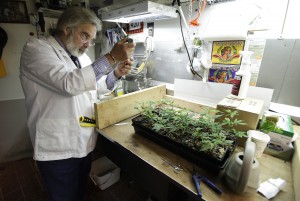The future United States president was not the only big decision made on election day. Bills affecting the legalization of gay marriage in Washington, Maryland and Maine and marijuana in Washington and Colorado were also passed on Nov. 9th election.
A total of four states voted on issues surrounding same-sex marriage. Washington, Maryland and Maine voted to approve, and Minnesota voted to reject, a proposed amendment to the constitution that would ban same-sex marriage.

New York, Connecticut, Iowa, Massachusetts, New Hampshire, Vermont and Washington, D.C. already allow gay marriage, but according to businessweek.com, this was done through lawmakers or court rulings, while the most recent states to approve did so by public vote.
According to businessweek.com, almost $13.6 million was spent in support of gay marriage in Washington alone. Big donors to the campaign included Bill Gates and New York mayor Michael Bloomberg.
People over 21 in Colorado and Washington saw another monumental change in their states when recreational marijuana use was legalized on election night.
Oregon was another state to vote on a marijuana-related measure, but the measure was defeated.
HLNTV.com provides headline news for CNN.com and reported on Colorado Governor John Hickenlooper’s reaction to the legalization of marijuana via a written statement released by his office.
“The voters have spoken, and we have to respect their will,” Hickenlooper said. “This will be a complicated process, but we intend to follow through. That said, federal law still says marijuana is an illegal drug, so don’t break out the Cheetos or goldfish too quickly.”
While Colorado voted to make legalizing marijuana a part of its constitution, Washington’s bill leaves it open to be vetoed by its governor.
Both states, however, are subject to the final decision made by President Obama on the subject.
Some speculation as to President Obama’s handling of the marijuana legalization is being based off of the previous legalization of medical marijuana, which is also a violation of federal law.
HLNTV.com reported that, “Allen St. Pierre, the executive director for the National Organization for the Reform of Marijuana Laws (NORML), says in the Obama administration’s first term more than 400 medical marijuana dispensaries were raided, and most of those were in California.”
Other states used election day to pass laws on medical marijuana specifically. Massachusetts and the District of Columbia are now among the 18 states permitting marijuana’s use for medical purposes, while Arkansas voters rejected this proposal.
“Interestingly, a person like Obama, who has an affinity, at least one can think regarding his ‘choom gang’ days with marijuana, pragmatically speaks about it as a state senator and later as a federal senator,” St. Pierre is reported as saying. “And then becomes president and has to run to the middle on the issue pretty clearly. And now that is the great mystery, going into his second term here — what, if anything are they going to do here?”
Popular opinion, HLNTV.com claims, for the legalization of recreational marijuana greatly stems from the amount of money that would come from the industry.
“California NORML has estimates that the legalization market in general in California alone is a $5 billion a year market,” St. Pierre is reported as saying. “Marijuana tourism here is going to make the folks in Amsterdam and Jamaica be very, very jealous.”




